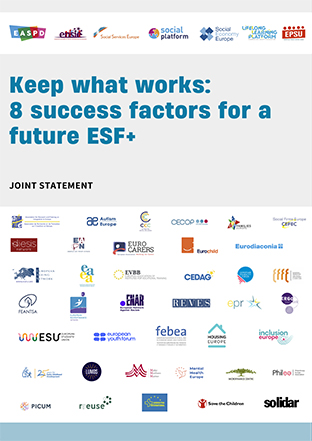As the EU’s main tool for investing in people, the European Social Fund (ESF) must continue to play a central role in the next EU budget. This is the demand made in a manifesto signed by 45 organizations and networks, including Social Economy Europe (SEE), Social Platform, the European disability movement and of public interest services, through a declaration calling for a strengthened European Social Fund Plus (ESF+), in order to fully address the needs of European citizens.
According to the statement, Europe is undergoing a major economic, digital, and sustainability transformation—something that also requires a social transformation to ensure balanced development across all sectors. The signatories call on Europe to reduce inequalities, promote social progress, and achieve high-quality employment. These are key elements to strengthen the single market and improve the European economy, which are vital to restore trust in political systems and the social market economy.
As the statement highlights, the next Multiannual Financial Framework must, of course, be improved and adapted to the evolving context and new priorities. “Improving a framework also means recognizing what has worked well,” the declaration states, adding that since its creation in 1957 with the Treaty of Rome, the ESF has been a cornerstone of EU investment—effectively addressing territorial disparities, focusing on local needs, and supporting innovation and reform in collaboration with local actors, social partners, civil society, and the social economy.
The Eight Success Factors of ESF+
The ESF, the declaration notes, has driven social progress by creating opportunities for millions of excluded people across Europe. That is why the signatories urge the European Commission to “build on these achievements and strengthen—rather than weaken or merge—the European Social Fund Plus (ESF+),” recalling eight “success factors” that should help “keep what works,” in reference to the ESF.
Among these success factors is the fact that the ESF has secured funding for achieving European social objectives and policies in areas such as quality employment, training, and social policies. It has also established multilevel governance and shared management to maximize impact, accountability, and sustainability.
The horizontal allocation of these funds has prevented emerging priorities in Europe from undermining social goals and needs. Public-private collaboration brings together public authorities, social partners, civil society, and the social economy, ensuring transparency, better targeting of investment needs, and greater ownership, coordination, and oversight.
Lastly, ESF+ offers targeted funding opportunities for local initiatives, such as proximity services, the social economy, and small and medium-sized enterprises (SMEs). This is made possible by creating a more enabling environment that allows smaller organizations to access and manage funding.
In line with the European Pillar of Social Rights, ESF+ stands for investment in long-term priorities, systemic reforms, and capacity building. It has contributed to reforming welfare systems across the European Union.
Full statement here.







